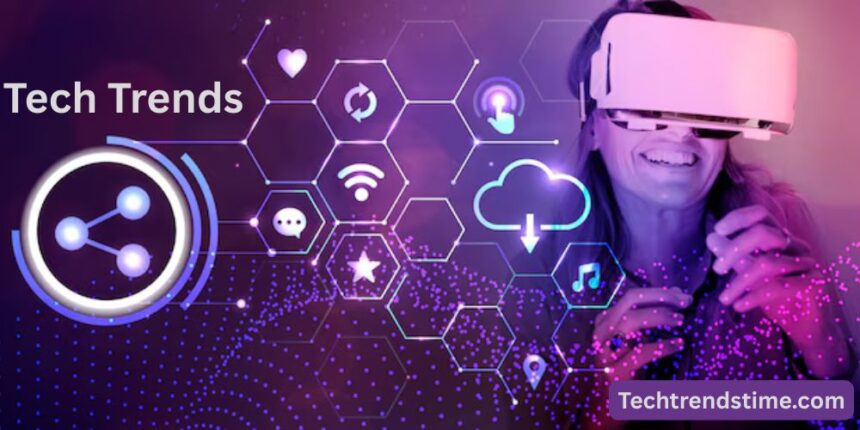Tech trends has become the backbone of human progress. Every facet of our lives—communication, healthcare, work, entertainment, education—has been touched and transformed by innovations. In this fast-paced digital era, tech trends aren’t just passing fads; they’re seismic shifts that define how we live and interact with the world. From artificial intelligence writing poems to self-driving cars navigating highways, it’s an exciting time to be alive.
The Importance of Embracing Technological Shifts
Embracing technology is no longer optional—it’s essential. For individuals, it means staying relevant in a job market that rewards digital fluency. For businesses, it’s a matter of survival. Those who fail to adapt risk falling behind or disappearing entirely. Tech trends fuel competitiveness, efficiency, and even creativity. They offer tools to solve global problems, from food scarcity to climate change, making them vital to a sustainable and prosperous future.
Artificial Intelligence (AI): The Brain Behind Smart Tech Trends
AI is at the heart of today’s most disruptive technologies. It powers everything from recommendation engines to autonomous drones. What’s fascinating is how AI mimics human intelligence to perform tasks like decision-making, language translation, and problem-solving Businesses across the globe are tapping into AI to gain insights from big data, automate repetitive processes, and enhance customer service. Chatbots, predictive analytics, and fraud detection systems are just a few ways AI is streamlining operations and driving profits.
Machine Learning: Teaching Machines to Think
Machine learning (ML) is a branch of AI that allows computers to learn from data and improve over time without explicit programming. In finance, it’s used to detect anomalies in transactions. In healthcare, it’s being deployed to predict disease outbreaks and optimize treatment plans. The more data ML systems consume, the better they get—making them crucial in a data-rich future.
Quantum Computing: The Future of Computation
While still in its infancy, quantum computing holds the promise to solve complex problems that traditional computers can’t. Imagine optimizing global supply chains, developing next-gen pharmaceuticals, or modeling climate change with pinpoint accuracy—all in seconds. Big players like IBM, Google, and Microsoft are racing to make quantum computing practical, and when they do, expect a technological renaissance.
Extended Reality (XR): Merging the Physical and Digital
XR, which encompasses AR, VR, and MR (mixed reality), is revolutionizing how we interact with content. Doctors can now simulate surgeries for training, while patients use VR to manage chronic pain and anxiety. It’s like stepping into a virtual operating room or a meditative escape. Try-before-you-buy has taken a new form. AR allows you to see how a couch fits in your living room or how a lipstick shade looks on your face—all from your phone.
5G and Beyond: Powering the Hyperconnected Era
The deployment of 5G networks is creating a superhighway for data, enabling smoother streaming, faster downloads, and real-time communication. It’s paving the way for innovations like remote surgeries, autonomous transport, and smart city infrastructures. Edge computing processes data closer to the source instead of relying on a centralized cloud. This drastically reduces latency, making it ideal for real-time applications like autonomous driving, industrial automation, and even live sports analytics.
The Internet of Things (IoT): Making Everything Smarter
IoT connects everyday devices to the internet, enabling them to send and receive data. Think smart thermostats, fridges that notify you when you’re out of milk, and traffic lights that adapt to traffic conditions. As IoT expands, homes, cities, and industries are becoming more intelligent and responsive. In an age where data is more valuable than oil, cybersecurity has become paramount. AI is being used to detect and respond to threats faster than any human could. It analyzes patterns and predicts breaches before they happen, acting as a digital guard dog. From facial recognition to retina scans, biometrics are replacing traditional passwords, adding an extra layer of personal security.
Blockchain Technology and Web3 Revolution
Blockchain is redefining trust in digital transactions by making them transparent and immutable. DeFi platforms eliminate intermediaries like banks, enabling peer-to-peer lending, trading, and investing—accessible to anyone with internet. NFTs are transforming ownership of digital assets, while smart contracts automate agreements, ensuring they execute only when conditions are met.
Robotics and Automation in Daily Life
From vacuuming floors to delivering groceries, robots are integrating into our daily routines. Robots now assist with surgeries, dispense medications, and provide companionship for the elderly, offering both physical and emotional support. Driverless cars, trucks, and drones are no longer futuristic dreams—they’re being tested and deployed in real-world scenarios, reducing human error and improving logistics.
Green Technology and Sustainable Innovation
Green tech is vital in the fight against climate change. From solar panel advancements to biodegradable electronics, sustainability is becoming a core design principle. tech trends is boosting efficiency in solar, wind, and hydro energy systems, making renewable energy more scalable and affordable than ever. Designing electronics that are repairable, recyclable, and reusable is gaining momentum, reducing e-waste and conserving resources. Fitness bands, smartwatches, and health-tracking rings are more than accessories—they’re personal health assistants. They monitor heart rate, sleep quality, and even detect irregular heartbeats, helping users make informed health decisions.
Biotechnology and Tech-Driven Healthcare
Tech trends is merging with biology in profound ways. CRISPR gene-editing, lab-grown organs, and AI-driven diagnostics are revolutionizing medicine and extending lifespans. Voice assistants like Alexa and Google Assistant are becoming more conversational and intuitive. NLP advancements mean your tech understands context, tone, and even emotion, bridging the gap between humans and machines.
Remote Work Technology and Digital Workspaces
The pandemic accelerated the shift to remote work, and the tech world responded with smarter collaboration tools. Cloud computing, virtual whiteboards, and AI note-takers are making remote teams just as productive—if not more—than their in-office counterparts. Cities are becoming smarter with traffic sensors, smart lighting, and data-driven urban planning. These technologies reduce energy use, minimize congestion, and improve quality of life for urban residents.
Education 4.0: Technology Transforming Learning
AI tutors, VR classrooms, and personalized learning paths are redefining education. With tech, learning is becoming more accessible, engaging, and tailored to individual needs. With great tech comes great responsibility. From surveillance concerns to algorithmic bias, ethical challenges are mounting. Companies must prioritize privacy, fairness, and transparency to ensure technology benefits all.
Tech in Space Exploration and Aerospace
Private companies like SpaceX and Blue Origin are democratizing space travel. Satellites are delivering global internet, while Mars missions are laying the groundwork for interplanetary colonization. tech trends is helping farmers monitor soil health, predict yields, and automate irrigation. AgriTech is essential to feeding a growing population amid climate change challenges.
FAQs About tech trends
What is the most influential tech trend in 2025?
AI continues to dominate across industries, with applications in healthcare, finance, marketing, and even creative work.
How does quantum computing differ from classical computing?
Quantum computing uses qubits that can represent multiple states simultaneously, enabling it to solve complex problems faster than classical computers.
What is the biggest concern with rapid tech adoption?
Data privacy and ethical considerations are top concerns, especially with AI, surveillance tech, and social media algorithms.
Which industry benefits most from IoT?
Manufacturing, healthcare, agriculture, and smart cities benefit massively from real-time data and automation via IoT.
How can individuals keep up with tech trends?
Subscribe to trusted tech news sites, follow industry leaders on LinkedIn, attend webinars, and stay curious!
Conclusion
Tech trends is advancing at an exponential pace, and the best way to prepare is to stay curious and adaptable. Whether you’re a tech enthusiast, a business owner, or just someone trying to keep up, understanding these trends gives you the tools to thrive—not just survive—in a digital world. Embrace innovation, but always consider the ethical and societal impacts. The future isn’t just coming—it’s already here.


